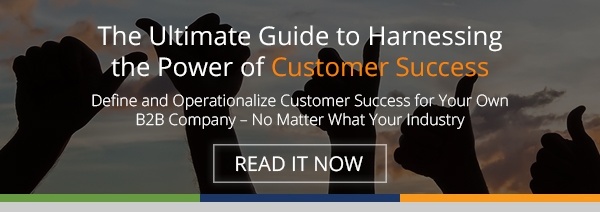Our team has always been obsessed with helping our customers achieve their goals. Our approach is to partner with our clients in growing their businesses – because we know that their success is our success. Any good professional services company would do the same.
That said, given the importance of customer success to the health of our agency and, of course, to our clients' businesses, we dove even deeper into this buzzing topic a couple years ago—with respect to not only research and content but our own processes and services. And we couldn't be more excited that new tools and technologies are quickly emerging to help companies of all types better serve their existing customers.
Why is the topic of customer success so important? A really effective (and necessary) way to grow revenue is by reducing churn. Retention and, ultimately, profitability are impacted positively by delivering an impeccable customer experience. According to Bain & Company, a 5% increase in customer retention can increase a company’s profitability by 75%. Wow! That’s a stat worth pursuing!
But many companies—across all industries—have been doing customer success activities as part of their customer service and account management strategies long before this terminology was used to describe them. In reality, customer success is everywhere if you know where to look. We invite you to read more about our take on customer success strategy for B2B companies. But for now, we’ll review three examples of companies that are doing customer success well, and how we can learn from them.
Example #1. Amazon
According to Jeff Bezos, CEO of Amazon, “We see our customers as guests invited to a party, and we are the hosts”. According to stats, Amazon guests are attending and spending at this party, with a staggering 44% of U.S e-commerce sales in 2017! Why? Because this company’s customer success strategy drives return visitors by making shopping feel like a dream at every stage.
Amazon delights their customers with a smooth and informed purchasing experience and return system, lightning fast delivery, and excellent customer support. You can easily access your previous orders for repeat purchases, as well as set up auto purchasing for better pricing.
“We love to take things that are ordinary and then improve them to the point where people think ‘wow, that’s amazing.’ We have seen many of our innovations become the new normal for our customers. For example, looking at customer reviews as a basis for a purchase decision or same-day delivery as a new delivery standard.” – Ralf Kleber, Country Manager, Germany, Amazon
As opposed to simply reacting to problems, Amazon is good at taking a proactive approach to ensuring customers are not only happy but that they're expectations are exceeded to the point that they change for other online retailers. However, if you do ever have an issue (which is VERY rare, according to this frequent Amazon shopper), their excellent staff aims to please. Taking care of their customers the way they do, it’s hard not to have love for Amazon.
Example #2. HubSpot
In a nutshell, we see customer success as boiling down to delivering exceptional outcomes and experiences for your customers – and being able to measure the impact. No stranger to this topic, marketing and sales software giant HubSpot has been writing and revising their version of customer success protocol for a long time. And their 2018 release of their new Service Hub product—including tools like a knowledge base, a ticketing system, and customer feedback surveys—reflects their commitment to the cause on behalf of their own customers.
"If B2B companies want to get ahead of the game, they are going to have to get rid of all the friction in their business to better attract, engage and delight customers. It used to be what you sold that mattered, but now it's how you sell. [In the past,] your product needed to be 10 times better than the competition's. Now, your customer experience must be 10 times lighter than the competition's." – Brian Halligan, CEO, HubSpot
Customer success with HubSpot is present in every interaction. They have teams devoted to success at every stage of the buyer's journey, from prospect to customer to evangelist or partner. Their success strategy includes ongoing training, certification offerings, extremely knowledgeable support, a variety of troubleshooting and problem-solving options, and constant monitoring of user engagement and satisfaction, all leading to a thriving user base. They truly enable customers to maximize the use of their product's features and functions – and, consequently, they are able to retain a very educated and enthusiastic customer base.
Example #3. Achieve Test Prep
ATP is a for-profit education consultant and test prep company. They help students earn degrees more quickly and for a lower cost. Everything they do is focused on customer success. Their sales process includes analyzing the opportunity to maximize test-out, mapping a student path based on their goals and unique situation, and providing a plan that works for them. This Achieve Test Prep customer says it all...
"I thought this must be too good to be true as I had been researching college programs on my own and was unsuccessful… Within two days, I was enrolled in Achieve’s program. This has been one of the best decisions I have made. The teachers are personable and take the time to make sure every student is fully prepared. I have successfully tested out of 7 college courses so far, and I am almost finished with the program and almost have my degree." – Customer Testimonial
Once in the program, students boast exceedingly high pass rates, ongoing educational support and free retakes for the few that don’t pass the first time. They even offer job placement and financing, ensuring success from start to finish. Again, ATP excels at providing exceptional outcomes and experiences for their customers, and they have the numbers to back it up.
A Few Key Takeaways...
Customer success actually begins way before a person ever becomes a customer. It starts in the marketing and sales process. Every touch point that a person has with your company matters, and if a prospect converts into a customer, those experiences at each touch point will stay with them and continue to shape their perception of your business.
But another important factor is ensuring your products or services are a good fit for the customer—and that the customer is a good fit for your business—before the engagement begins. Perhaps even more important to customer success is to set appropriate expectations as soon as possible. The onboarding process and first 90 days of any business relationship are critical, and it's essential that your team allocates the necessary time and resources to build a solid foundation for a fruitful long-term relationship. Here are a few other things to consider when working on your own customer success strategy...
- Do your research. What does your customer's journey look like? What are the pitfalls they encounter along the way? How can your company intercept any issues before they happen? Build a process to produce the best outcomes.
- This is not a one-size-fits-all methodology. Customer success is PERSONAL, to your company and to your customers. Dig deep into your culture, processes, content and people to find ways to deliver outstanding value. You can start by considering all the interactions that you have with a prospect or customer and thinking about the ways you can make those interactions exceptional.
- Customer success happens across all departments. An effective program requires a company-wide commitment. As noted in the examples above, customer success happens as a result of more than just one manager. All departments must be using the same playbook; a success silo will not work.
- Measure and refine. Measuring the impact of your customer success initiatives is just as important as carrying them out. What KPIs will you track to analyze and improve your efforts? Churn rate and customer satisfaction are two to watch. However, your measurement should be based on your business goals and be realistic for your company. Here are a few customer retention metrics you will find useful!
- Platform or no platform? Small companies will likely start with a team and a plan. Larger companies will probably want a platform to manage and automate their efforts. Some of the players in this space are: Strikedeck, Gainsight, and Totango. But like we said, even our partners at HubSpot have developed some helpful tools to support companies entering this arena.
What’s your company's version of customer success? Have you implemented a strategy? We'd love to hear about your efforts in the comments below. And if you're looking for help, reach out and connect with our team!




